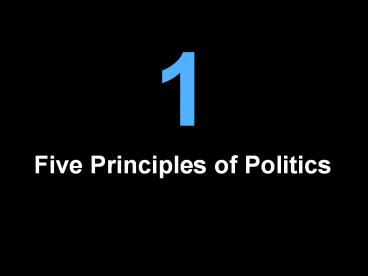Five Principles of Politics - PowerPoint PPT Presentation
1 / 26
Title: Five Principles of Politics
1
1
- Five Principles of Politics
2
Making Sense of Government and Politics
- Two fundamental questions about government and
politics - What do we observe? An empirical question
- Why? Requires building a theory around principles
- Two objectives in this introductory chapter
- Explain what we mean by government and politics
- Introduce our five principles of politics
3
What is Government?
- The institutions and procedures through which a
land and its people are ruled - Governments may be simple, like a tribal council
that makes all decisions, or they may be complex,
like our own system of separate branches and
levels of government
4
Discussion Government in a Farming Society
- Imagine that everyone in this room is a farmer in
our own self-contained society - Were all equal in every respect
- One of us proposes to build an irrigation system
- How do we make decisions?
5
Forms of GovernmentInclusiveness
- Autocracy A single individual rules
- Oligarchy A small group of landowners, military
officers, or wealthy merchants rules - Democracy A system of rule that permits
citizens to play a significant part in the
governmental process
6
Forms of GovernmentRecognition of Limits
- Constitutional Formal and effective limits are
placed on the powers of government - Authoritarian No formal limits are placed on
government but government may be effectively
limited by other social institutions - Totalitarian No formal or effective limits on
governments power of any kind
7
What is Politics?
- The conflicts and struggles over the leadership,
structure, and policies of government - Politics takes many forms voting, running for
office, joining groups and parties, lobbying, and
even speaking to friends and neighbors - The 5 principles of politics can be used to
explain political action
8
Clicker Question
- Imagine a hypothetical society in which a king
has almost total power but is constrained in his
coercive power by the church. This government
would best be described as a(n) - authoritarian democracy.
- constitutional autocracy.
- totalitarian oligarchy.
- authoritarian autocracy.
9
Introducing the 5 Principles of Politics
- All political behavior has a purpose
- Institutions structure politics
- All politics is collective action
- Political outcomes are the products of individual
preferences, institutional procedures, and
collective action - History matters
10
Rationality Principle
- All political behavior has a purpose
- Political behavior is instrumental
- Not random
- Done with forethought
- Calculation
- Political actors pursue policy preferences,
reelection, power, and to maximize their agency
budgets
11
Institution Principle
- Institutions structure politics
- Institutions are the rules and procedures that
provide incentives for political behavior - Remember that institutions themselves are not
necessarily permanently fixed. Rules may change
they just dont change easily
12
Institutions Provide Authority in Four Ways
- Jurisdiction The domain over which decisions
may be made - Agenda and Veto Power Gatekeeping power and the
power to say no - Decisiveness Rules for decision making
- Delegation Transmission of authority
13
Collective Action Principle
- All politics is collective action
- Collective action is difficult and the difficulty
mounts as the number of people and interests
involved grows - Sometimes there are collective action dilemmas
situations in which individually rational
incentives do not align with shared, collective
interests
14
A Collective Dilemma
15
Collective Action is Difficult
- Collective action becomes even more difficult as
the number of parties involved increases or as
the ability to bargain face-to-face is hampered.
Examples - Free Riding
- Tragedy of the Commons
- Institutions are the solutions to these problems
16
Policy Principle
- Political outcomes are the products of individual
preferences and institutional procedures - The policy principle is the logical combination
of the first three principles
17
History Principle
- How we got here matters
- Path dependency certain possibilities are made
more or less likely because of the historical
path taken
18
Clicker Question
- A member of Congress seeks to bring additional
dollars home to his districts for construction of
roads and bridges. This is an example of the - Institution Principle.
- Rationality Principle.
- History Principle.
- Collective Action Principle.
19
(No Transcript)
20
(No Transcript)
21
(No Transcript)
22
(No Transcript)
23
(No Transcript)
24
(No Transcript)
25
(No Transcript)
26
(No Transcript)































